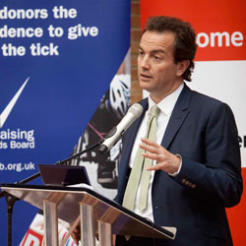There were calls from MPs and fundraisers alike for charities to stop infighting about clothing collections and to focus on tackling and preventing criminal activity, at a meeting of politicians, charities and collectors yesterday.
The Charity Clothing Collections Symposium, in Westminster, saw Conservative MP Tracey Crouch lead the charge chastising charities for attacking each other on the issue of which type of collections are best when they should be addressing bag theft and fraud and instilling confidence in giving.
“We shouldn’t have blue-on-blue fighting,” said Crouch. “I think it scares the general public when there are stones cast at each other over how much is given to charity and so on… Our target is not each other, our target is bogus collectors.”
Peter Storey, Kidney Research UK director of marketing, described the debate during the Institute of Fundraising’s working party on the house-to-house collections code (of which he was chairman) as a “sparring match”.
“I know of no other industry that has a public debate about its margins,” he said. “Why are we going down this route?” Instead of taking shots at each other the sector must unite to deal with the "scumbags" responsible for bag fraud and theft, he said.
‘Strategic threat to the market’
While the symposium was called to address charity bag theft and fraud, with the value of rag on the international markets remaining high, Storey warned that charities will not only face threats from criminal networks but from legitimate, commercial operators looking to make money.
“It’s going to get more competitive,” he said. “There is a strategic threat to this market for charities.”
John Miley, licensing officer for the Broxtowe Borough Council and chairman of National Association of Licensing Officers in the Midlands, said that in his authority area alone there has been a fourfold increase in collections applications in the past two years. This does not include collections run by the 43 national exemption certificate holders (charities which are able to run collections without local authority approval), which Miley quipped are “the bane of my life”.
Storey suggested that councils, which across the board have to make cuts of 28 per cent to their budgets, could become interested in textile recycling. In July in Wales nine local authorities, including Cardiff, appointed a commercial contractor to exclusively operate textile banks on council property across the region for the next three years, with the option of extending for an additional two. This follows the separate decisions in May of Northumberland and Hertfordshire County Councils to award their respective collection bank contracts to commercial operators, which offer strong returns to the councils as opposed to charitable income.
Action on bogus collectors
The target of the government and sector group, however, very much remains the criminal networks responsible for fraud and theft.
National Fraud Investigations Bureau DI Amanda Lowe said that while there has been success lately, such as in the arrest of four people following a raid in Rainham, the intelligence the NFIB has on the issue is “just the tip of the iceberg”. It was made all the more pertinent today as London’s Air Ambulance warned about a tranche of fraudulent collection bags being distributed in Eltham and Wanstead which ask for donations to the ‘Air Ambulance Service’.
There were calls for the Institute of Fundraising and FRSB to develop public relations campaigns. Crouch suggested they target MPs, herself having sent out a newsletter to her 40,000 constituents outlining the issue. There was further suggestion from NALEO that the two organisations, and Charity Retail Association, work together to produce a guide for charities on how to effectively report charity bag crime – a notoriously complex matter.
Alistair Mclean, chief executive of the FRSB, was receptive to the idea. “There is certainly an argument for a sector-wide campaign,” he said.
In the meantime, the Trading Standards Institute is expecting to team up with Nigel Jones QC to provide a legal helpline to trading standards officers confused about their options in acting on fraudulent collections within the next coming weeks. The TSI is also set to launch an online toolkit on the subject, outlining seven different theft and fraud scenarios and suggesting under which laws they might be prosecuted successfully.
But suggestions of a government-backed ‘Give with Care’ campaign – under way now in Scotland – seemed unlikely to take hold south of the border with the minister for civil society Nick Hurd indicating it would be too costly.
Legislative developments
Hurd said, however, that the issue is one that “matters” to him and to the public.
The fact that companies operating collections purely for profit do not require a licence at all was brought up as a major issue by a number of people at the symposium, but Hurd indicated that the system itself is unlikely to change. He said that the review of the Charities Act 2006, due to begin in November, will be looking at licensing and toughening up sanctions for unlicensed collections but did not suggest commercial operators will be brought into the licensing fold.
“I don’t think regulation is the key to success here,” he said, arguing that coordination and building public trust could help address the issue.








